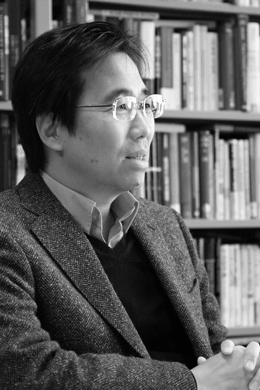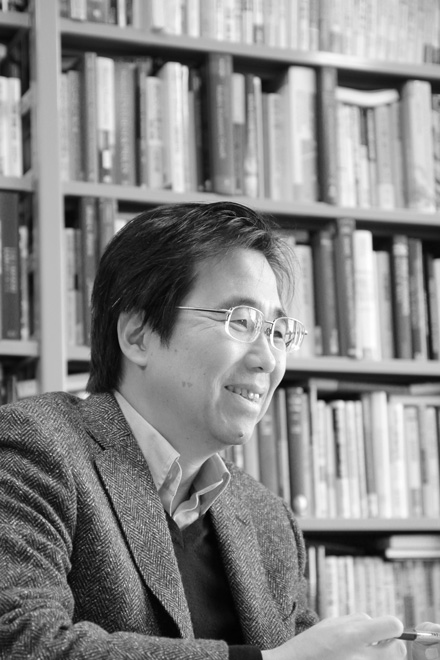
Q: You are active in a wide range of economics fields. If you had to name your area of specialization, what would that be?
Iwamoto: I describe it as “public finance.” This involves a very wide variety of areas, so when conducting research on public finance the studies naturally tend to spread to many other fields. I’m the type of person with wide interests, who sticks his neck into many different things, so yes, I suppose I have studied quite a lot of areas over the years. I write one paper about one topic, and if that comes together well I go on to the next theme. That kind of style has resulted in my writing papers on a variety of subjects. In that sense, I may have a harder time than others in narrowing down just what it is that I specialize in.
Q: It’s rather unusual, isn’t it, for an economist to take up so many different topics?
Iwamoto: Perhaps, though I wouldn’t say that’s either a good or bad thing. In trying to define economics, rather than defining the discipline by the object of study, the economy, it is more common to define it as the economic way of thinking. There are many people who apply the economics thinking approach to targets other than the economy. This is seen as the contribution economics makes to society. I find myself sympathetic with that thinking.
Q: It’s rather unusual, isn’t it, for an economist to take up so many different topics?
Iwamoto: Perhaps, though I wouldn’t say that’s either a good or bad thing. In trying to define economics, rather than defining the discipline by the object of study, the economy, it is more common to define it as the economic way of thinking. There are many people who apply the economics thinking approach to targets other than the economy. This is seen as the contribution economics makes to society. I find myself sympathetic with that thinking.
Q: It’s important for GSDM students studying natural sciences or social sciences other than economics, to know the basics of economics, right?
Iwamoto: In carrying on with our daily lives, we are propelled by the market economy. A feature of the way the market economy works is its use of knowledge. The knowledge of each individual is limited, but each one possesses separate knowledge; so when you put together all the knowledge of the human race, it’s an enormous amount. The market economy functions by making use of that knowledge as a whole.
Take this ballpoint pen in front of me, for example. I have no knowledge about how to make such a pen. Yet if I hand over some money, I can buy a ballpoint pen. The person who made this pen, on the other hand, has technical knowledge about pens but does not have the knowledge I possess. In other words, I am helped by the knowledge of the person who made this pen, while the person who made this pen is helped by the knowledge of various other people.
Each of the individuals acts without knowing about the other individuals, but the market economy functions in such a way that the pen properly gets to where it is needed. By knowing how this works, we come to realize that our own work and activities are being aided by the knowledge of people we do not know at all.

Q: What other benefits do you see to having GSDM students learn the basic of economics?
Iwamoto: I think it’s good to have them learn the economic way of thinking. It should prove highly useful also in the future for students in the sciences. To put it in simple terms, the economic way of thinking is, first of all, learning to be aware of costs. A hugely important concept in economics is “opportunity cost.” That is, no matter what you do it entails costs. Generally, people think of costs as monetary expenses; but there are also costs that are not monetary, and these are very large. A student taking a doctoral program, for example, during the three years in school has to forego the income that could have been earned by working all that time. That’s quite a large amount, so it’s important to use that time effectively.
Another example is carrying out experimentation to make something, which requires costs for each of the materials. Besides the costs that we can see with our eyes, it’s important to grasp the invisible costs. Also, basic to economics is the approach of looking not just at costs but seeing these together with the benefits of what will result, in deciding ultimately what to do. In the field of operations research, applicable to decision-making in a wide range of fields, initially it was people in mathematical economics that made major contributions.
Second, each one of us, day after day, is involved in the economy as we use money and work to earn money. Yet when we look at the economy not from this individual viewpoint but get an overview of the workings of the economic system in society, or try to analyze it objectively, we learn that things look different when the viewpoint changes. I think, too, that by studying the workings of the economy, students gain the ability to look objectively at the various research activities they themselves are involved in. For someone in the sciences, I would expect them to be able to see the impact on society from the research they have conducted or what they have created, not just within the scope visible from their own research, but to go beyond that and try to obtain an objective overview of that impact. I believe that this applies not just to economics; studying social sciences likewise gives students various new ways of looking at things.
